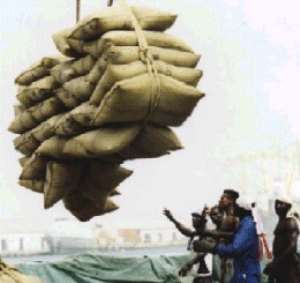
Tamale, Feb 15, GNA - The government has over the last four years, spent more than 125 million dollars to import between 253 and 780 tonnes of rice into the country.
The imports have led to low levels of domestic rice production and the loss of thousands of jobs, particularly in Northern Ghana, which was nicknamed the "Rice City" in the early 1970s.
Mr Michael Lumor, a Programme Manager of Action Aid International, Ghana (AAIG) announced this at a one-day dissemination workshop on: "Agro-import surge study: The case of rice in Ghana", in Tamale on Wednesday.
Participants at the workshop included Directors of Agriculture, District Chief Executives, officials of the Ministry of Trade and Industry, as well as, farmers' groups.
The study, which was undertaken by AAIG, attempted to assess the extent to which rice imports to Ghana constituted import surge. It also tried to understand the effects of the high rice imports on the local rice industry in terms of the livelihoods of households, as well as poverty alleviation and food security.
Mr Lumor said in the estimation of the AAIG, its partners and communities, "the future looks very bleak for the local rice farmer". "This makes the demand for urgent and collective action necessary for poor people's voices to be heard at policy and law-making arenas in the country and beyond".
Mr Abraham Dwuma Odoom, a Deputy Minister of Local Government and Rural Development, said the stagnation of the local rice industry due to import surges and its consequences for households and the food security of the country was a major source of concern to government.
He said recommendations in the study would serve as a guide in government policy undertakings, as far as rice production and food security for household were concerned.
He said the government was considering how the promotion of the production and consumption of locally produced rice could be achieved by incorporating it into the National School Feeding Programme and feeding in state institutions.
Mr Odoom told rice farmers that the government recognised their contributions to the growth of the economy and as such, it would continue to put in place measures that would better their lot.
Alhaji Abu-Bakar Saddique Boniface, Northern Regional Minister noted that as a result of the liberalised market and the adoption of the structural Adjustment Programmes (SAPs) in the 1980s, the markets of most African countries were opened up.
These countries, he said, now had to contend with increasing imports and high tariffs on processed products from developed countries. He said this trend had led to a situation, in which Ghana's trade had been dominated by imports of both food and non-food items, greatly worsening the employment situation in the country. Alhaji Boniface said for instance, in Northern Ghana now, most of the well to do rice farmers in the 1970s had now diverted their investments into other sectors of the economy such as the construction industry or trade.
He urged the participants to come out with pragmatic measures that would help improve the local rice industry and food security at all levels. 15 Feb. 06




 Lay KPMG audit report on SML-GRA contract before Parliament – Isaac Adongo tells...
Lay KPMG audit report on SML-GRA contract before Parliament – Isaac Adongo tells...
 Supervisor remanded for stabbing businessman with broken bottle and screwdriver
Supervisor remanded for stabbing businessman with broken bottle and screwdriver
 NDC watching EC and NPP closely on Returning Officer recruitment — Omane Boamah
NDC watching EC and NPP closely on Returning Officer recruitment — Omane Boamah
 Your decision to contest for president again is pathetic – Annoh-Dompreh blasts ...
Your decision to contest for president again is pathetic – Annoh-Dompreh blasts ...
 Election 2024: Security agencies ready to keep peace and secure the country — IG...
Election 2024: Security agencies ready to keep peace and secure the country — IG...
 People no longer place value in public basic schools; new uniforms, painting wil...
People no longer place value in public basic schools; new uniforms, painting wil...
 'Comedian' Paul Adom Otchere needs help – Sulemana Braimah
'Comedian' Paul Adom Otchere needs help – Sulemana Braimah
 Ejisu by-election: Only 33% of voters can be swayed by inducement — Global InfoA...
Ejisu by-election: Only 33% of voters can be swayed by inducement — Global InfoA...
 Minority will expose the beneficial owners of SML, recover funds paid to company...
Minority will expose the beneficial owners of SML, recover funds paid to company...
 Prof. Opoku-Agyemang has ‘decapitated’ the NPP’s strategies; don’t take them ser...
Prof. Opoku-Agyemang has ‘decapitated’ the NPP’s strategies; don’t take them ser...
